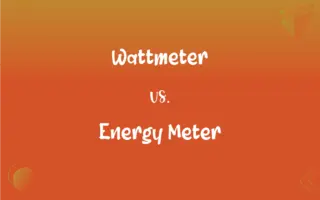VB vs. C: What's the Difference?
Edited by Aimie Carlson || By Harlon Moss || Published on February 7, 2024
VB (Visual Basic) is a high-level, event-driven programming language known for its simplicity, while C is a lower-level, procedural language valued for its efficiency and control over system resources.

Key Differences
VB is a high-level, object-oriented language designed for ease of use and rapid application development. C, in contrast, is a procedural language known for its close-to-hardware operation, providing more control over system processes and memory.
VB is often used in Microsoft's integrated development environment for creating Windows applications with graphical user interfaces. C is widely used in system programming, embedded systems, and for applications requiring direct hardware manipulation.
VB has a more straightforward syntax and a relatively easier learning curve, making it accessible to beginners. C has a more complex syntax that offers greater control, but it requires a deeper understanding of programming concepts.
VB, being a higher-level language, sacrifices some performance efficiency for ease of use. C, known for its efficiency, is closer to machine code, resulting in faster execution times but at the cost of increased complexity.
VB is primarily used for desktop applications, especially within the Windows ecosystem. C, with its versatility and efficiency, is used in a wide range of applications, from operating systems to embedded software.
ADVERTISEMENT
Comparison Chart
Language Paradigm
High-level, event-driven
Lower-level, procedural
Typical Use Cases
Windows GUI applications
System programming, embedded systems
Syntax Complexity
Simple, beginner-friendly
Complex, offers more control
Performance
Less efficient, more user-friendly
Highly efficient, closer to hardware
Application Development
Rapid application development focus
Suitable for a wide range of applications
ADVERTISEMENT
VB and C Definitions
VB
VB is known for its event-driven programming model.
Handling button clicks in VB is straightforward with its event-driven approach.
C
C is known for its efficiency and control over system resources.
We used C for our embedded system project to optimize resource usage.
VB
VB simplifies the creation of graphical user interfaces.
Designing forms in VB is intuitive, thanks to its integrated development environment.
C
C is a lower-level language compared to many modern languages.
Learning C provides a deeper understanding of how software interacts with hardware.
VB
VB is suitable for rapid application development.
We quickly developed a prototype using VB due to its rapid development capabilities.
C
C is widely used in system and application programming.
Many high-performance applications are written in C due to its speed and efficiency.
VB
VB is a high-level programming language developed by Microsoft.
I used VB to create a user-friendly Windows application.
C
C is a foundational programming language developed in the early 1970s.
The UNIX operating system was one of the first major projects written in C.
VB
VB is part of the .NET framework for Windows platform.
VB.NET enhanced the language with more .NET framework features.
C
C has influenced numerous other programming languages.
Languages like Java and C++ were significantly influenced by the syntax and concepts of C.
C
A widely used programming language.
FAQs
What is VB best used for?
VB is best used for Windows-based applications and rapid development.
Is VB suitable for web development?
VB can be used for web development, particularly with ASP.NET.
What makes C a preferred language for system programming?
C’s efficiency and lower-level control make it ideal for system programming.
Can VB create complex applications?
While VB is user-friendly, it can also be used to develop complex applications.
Is VB easy to learn for beginners?
Yes, VB's simple syntax and event-driven approach make it beginner-friendly.
Can C interact directly with hardware?
Yes, C can directly manipulate and interact with hardware.
Can C be used for GUI application development?
While possible, C is less convenient for GUI development compared to higher-level languages.
How does C handle memory management?
C provides manual memory management, offering more control to the programmer.
Is C considered a portable language?
Yes, C is highly portable across different platforms and systems.
Are VB applications platform-independent?
VB applications are mostly platform-dependent, typically on the Windows OS.
How does C handle error detection?
C requires manual error detection and handling, unlike some higher-level languages.
Can VB applications run on multiple operating systems?
VB applications are primarily Windows-based, with limited cross-platform capabilities.
Does VB support object-oriented programming?
Yes, especially VB.NET supports object-oriented programming concepts.
Is VB integrated with any particular development environment?
VB is closely integrated with Microsoft’s Visual Studio development environment.
Does C support object-oriented programming?
C is not inherently object-oriented, unlike languages like C++.
What kind of database support does VB offer?
VB offers robust database support, especially in combination with .NET framework.
Is C suitable for beginners in programming?
C can be challenging for beginners but provides a strong foundation in programming concepts.
What is the execution speed of C compared to VB?
C generally has faster execution speed due to its lower-level operations.
How does VB handle memory management?
VB handles memory management automatically, especially in its .NET variant.
Is C still relevant in modern software development?
Yes, C remains highly relevant, particularly in system-level and performance-critical applications.
About Author
Written by
Harlon MossHarlon is a seasoned quality moderator and accomplished content writer for Difference Wiki. An alumnus of the prestigious University of California, he earned his degree in Computer Science. Leveraging his academic background, Harlon brings a meticulous and informed perspective to his work, ensuring content accuracy and excellence.
Edited by
Aimie CarlsonAimie Carlson, holding a master's degree in English literature, is a fervent English language enthusiast. She lends her writing talents to Difference Wiki, a prominent website that specializes in comparisons, offering readers insightful analyses that both captivate and inform.







































































